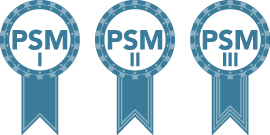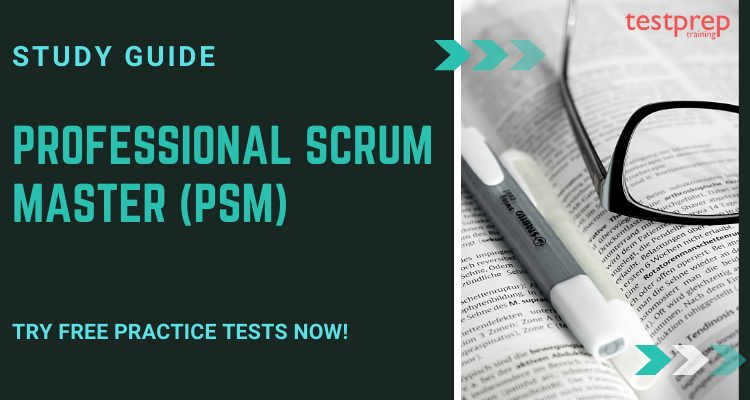The PSM certification is a highly respected and globally recognized certification in the agile community, and obtaining it can open up a world of career opportunities. To pass the PSM exam, you need to really know the Scrum framework and how to use it in real situations. That’s where the PSM study guide becomes crucial. It’s a must-have for anyone getting ready for the PSM test and aiming for certification.
In this blog, we’ll explore what the PSM study guide is, why it’s important, and how to use it effectively to maximize your chances of passing the PSM exam. So, whether you’re a seasoned Scrum Master or just starting out in your agile journey, this blog is for you!

Glossary for Professional Scrum Master (PSM) Terminology
Here’s a glossary of some common Professional Scrum Master (PSM) terminology:
- Scrum: Agile is a way of organizing and finishing hard projects, often seen in software work.
- Sprint: A time-boxed iteration of the Scrum process during which a potentially shippable product increment is created.
- Sprint Backlog: A list of tasks that the team plans to finish in the current work period is called a Sprint Backlog.
- Product Backlog: It’s a list of all the things that could be necessary for the product, and the Product Owner takes care of it, keeping it organized in a specific order.
- Product Owner: The person responsible for creating and prioritizing the Product Backlog.
- Development Team: This is the team that makes sure they have something that could be sent out as a product at the end of every work period.
- Scrum Master: The person responsible for ensuring the Scrum framework is understood and followed.
- Daily Scrum: A 15-minute meeting where the Development Team discusses what was done the previous day, what they plan to do that day, and any impediments.
- Sprint Review: A meeting at the end of each Sprint where the Development Team demonstrates the work completed during the Sprint.
- Sprint Retrospective: A meeting held at the end of each Sprint to reflect on what went well, what didn’t, and how the team can improve going forward.
Exam preparation resources for Professional Scrum Master (PSM) Exam
Here are some useful exam preparation resources for the PSM Professional Scrum Master I Exam:
- Scrum.org – This is the official website of Scrum.org, the organization that created and maintains the PSM certification. Here you can find the exam syllabus, sample questions, and other resources that will help you prepare for the exam: https://www.scrum.org/professional-scrum-master-i-certification
- The Scrum Guide – This is the official guide to Scrum, the agile framework that the PSM certification is based on. It’s a short, easy-to-read document that covers the key concepts of Scrum: https://scrumguides.org/scrum-guide.html
- Agile Manifesto – The Agile Manifesto is like a list of important beliefs and rules to follow when developing software using Agile methods. It’s important to have a good understanding of the Agile Manifesto and how it relates to Scrum: https://agilemanifesto.org/
- Scrum Open – Scrum Open is a free online course that provides an introduction to Scrum and prepares you for the PSM I exam. It includes interactive lessons, quizzes, and sample questions: https://www.scrum.org/scrum-open-assessment
- Scrum.org Forums – The Scrum.org forums are a great resource for asking questions and getting help from other Scrum practitioners. You can also find discussions about the PSM exam and tips for passing it: https://www.scrum.org/forum
- PSM Practice Tests – There are several websites that offer PSM practice tests that simulate the actual exam. These can be useful for getting a sense of the types of questions you’ll encounter and for identifying areas where you need to study more. Here are a few options:
- Scrum.org Practice Assessment: https://www.scrum.org/professional-scrum-master-i-assessments
- Testprep Training: https://www.testpreptraining.com/psm-professional-scrum-master-i-free-practice-test
Learning Path
The Professional Scrum Master (PSM) has three levels –
- Those who pass PSM I and get certified show they have a basic understanding of Scrum. PSM I certificate holders prove they know Scrum as it’s explained in the Scrum Guide and can use it in Scrum Teams. They have a consistent way of talking about and using Scrum.
- People who have passed PSM II, achieving certification, demonstrate an advanced level of Scrum mastery. PSM II certificate holders prove that they have an understanding of the underlying principles of Scrum and can effectively apply Scrum in complex, real-world situations.
- People who have passed PSM III, achieving certification, demonstrate a distinguished level of Scrum mastery. PSM III certificate holders have a deep understanding of the application and practices of Scrum and the Scrum Values in a variety of complex team and organizational situations.
Learning Objectives
Below are the objectives for all the three levels of the Professional Scrum Master (PSM).
- Understanding and Applying the Scrum Framework
- Developing People and Teams
- Managing Products with Agility
- Developing and Delivering Products Professionally
- Evolving the Agile Organization
Study Guide for Professional Scrum Master (PSM)
The preparation steps which are essential in order to successfully pass the Professional Scrum Master (PSM) exam. It is very important to have the right resources and enhance your skills with expert learning resources.

Scrum Official Website
Visiting the Scrum official website is an important step while preparing for the Professional Scrum Master (PSM) exam. The official site offers a lot of reliable information and sources which are very helpful in preparing for the exam. The resources such as study guide, sample papers, whitepapers, documentation, faqs, etc. The candidate can find all such important things on the official page. The candidate will find following assessment at the official page.
Prepare for the Assessment
Indeed the assessment is difficult to preparation to achieve a good passing score. Therefore it is very important to read the Scrum Guide and taking the Open Assessment Open Assessment Exam is not enough. It is critical to review the exam objectives –
- Assessment coves topics multiple Focus Areas defined by PSM Competencies.
- Questions focus to interpret the meaning from the Scrum Guide and it application within a Scrum Team.
- PSM Suggested Reading lists the Focus Area the questions may be selected during the assessment.
- Scrum Master Learning Path contains additional resources to help you prepare to take the PSM Assessment.
Scrum Training Program
Training programs are a very necessary step in the preparation of such exams like Professional Scrum Master (PSM). Scrum offers its own training programs on their various examinations and certifications. Professional Scrum MasterTM (PSM) is a 2-day course that covers the principles and process theory underpinning the Scrum framework, and the purpose of the Scrum Master in it. This course mixes lessons and team activities to teach the core of the Scrum and Agile approach.
Now that we have given you a brief regarding the exam, let’s begin with the study guide. However, if you somehow feel, you need to be well equipped with the details of the exam.
Books and Guides
After covering the basics, the next thing to focus on is books and study materials. It’s important to choose books that are filled with useful information. While finding a good book might be a bit challenging, it’s essential for gaining the knowledge and skills needed. Here are some references to consider:
- Firstly, Scrum Narrative and PSM Exam Guide: All-in-one Guide for Professional Scrum Master (PSM 1) Certificate Assessment Preparation Kindle Edition by Mohammed Musthafa Soukath Ali.
- Secondly, The Scrum Master Training Manual: The Definitive Guide for Professional Scrum Master – PSM Certification by iCertify Training.
- Lastly, Mastering Professional Scrum: A Practitioners Guide to Overcoming Challenges and Maximizing the Benefits of Agility (The Professional Scrum Series) 1st Edition by Stephanie Ockerman.
Join a Study Group
Getting involved in a study group can be really helpful for the candidate. It can motivate them to work harder. Plus, studying together in a group keeps them connected with others who are following the same path. These group discussions can also be really useful when it comes to the exam.
Try Practice Test
One of the most crucial things is for candidates to take Practice tests. These tests are important because they show if the candidate is ready for the real exam. Also, practice tests can help candidates see where they need to improve. Thankfully, there are many practice tests online, so candidates can pick the ones they like.
Elevate your career with a new study guide with advanced learning resources. So, prepare for Professional Scrum Master (PSM) with free practice tests



